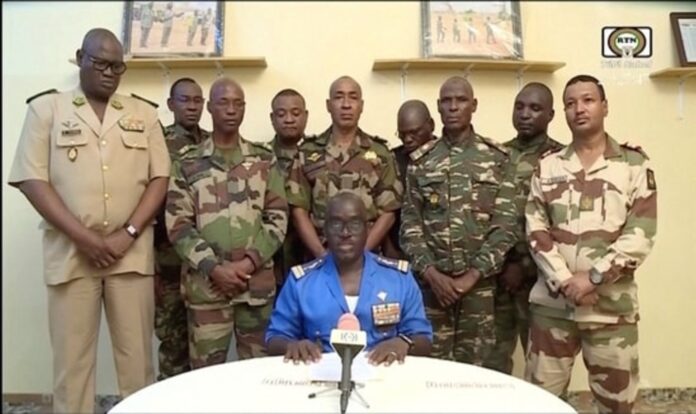In a dramatic turn of events on Wednesday, Niger’s government was reportedly overthrown by a group of soldiers in what appears to be a coup d’état. The coup attempt began when members of the Presidential Guard took President Mohamed Bazoum into custody, sealing off access to his residence and offices in the capital, Niamey. After failed negotiations, the soldiers refused to release him, leading to the suspension of all institutions, closure of borders, and imposition of a curfew from 10 pm to 5 am until further notice. Colonel-Major Amadou Abdramane, flanked by nine uniformed soldiers, announced the decision to put an end to President Bazoum’s regime in a televised address, citing concerns over the deteriorating security situation and poor economic and social governance.
President Bazoum, who took office two years ago in Niger’s first peaceful transition of power since independence from France, has received support from regional and global leaders, who have called for his immediate release. As the situation unfolds, neighboring Benin’s President Patrice Talon is set to mediate the crisis in Niamey, under the auspices of the Economic Community of West African States (ECOWAS). President Bazoum’s office, through a message on social media, described the coup as an impulsive action by elements of the Presidential Guard, affirming the readiness of the national armed forces and national guard to respond if the situation escalates.
Niger, burdened by poverty and jihadist insurgencies, has been facing immense challenges under President Bazoum’s leadership. The Sahel state has a history of coup attempts, and the recent actions by the military add to the instability in the region. The nation’s economy and security have been adversely affected by ongoing jihadist campaigns from neighboring Mali and Nigeria. The international community has swiftly condemned the attempted coup. ECOWAS and the African Union expressed their disapproval and called for President Bazoum’s safe and immediate release.
The European Union echoed their sentiments, pledging to stand against any attempt to destabilize Niger’s democracy. As the situation unfolds, both national and international leaders are closely monitoring the developments. President Talon’s mediation efforts and the backing of other diplomatic actors aim to find a peaceful resolution to the crisis and restore stability to Niger. However, with a history of political unrest and jihadist threats, the situation remains uncertain and requires delicate handling to prevent further escalation of tensions in the region.


